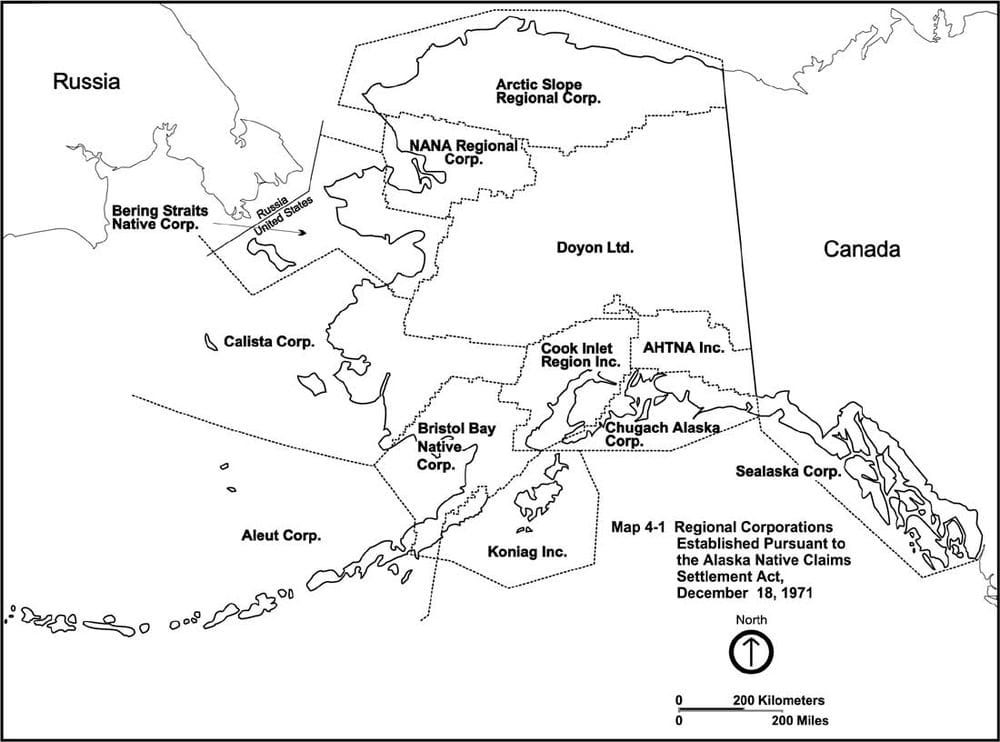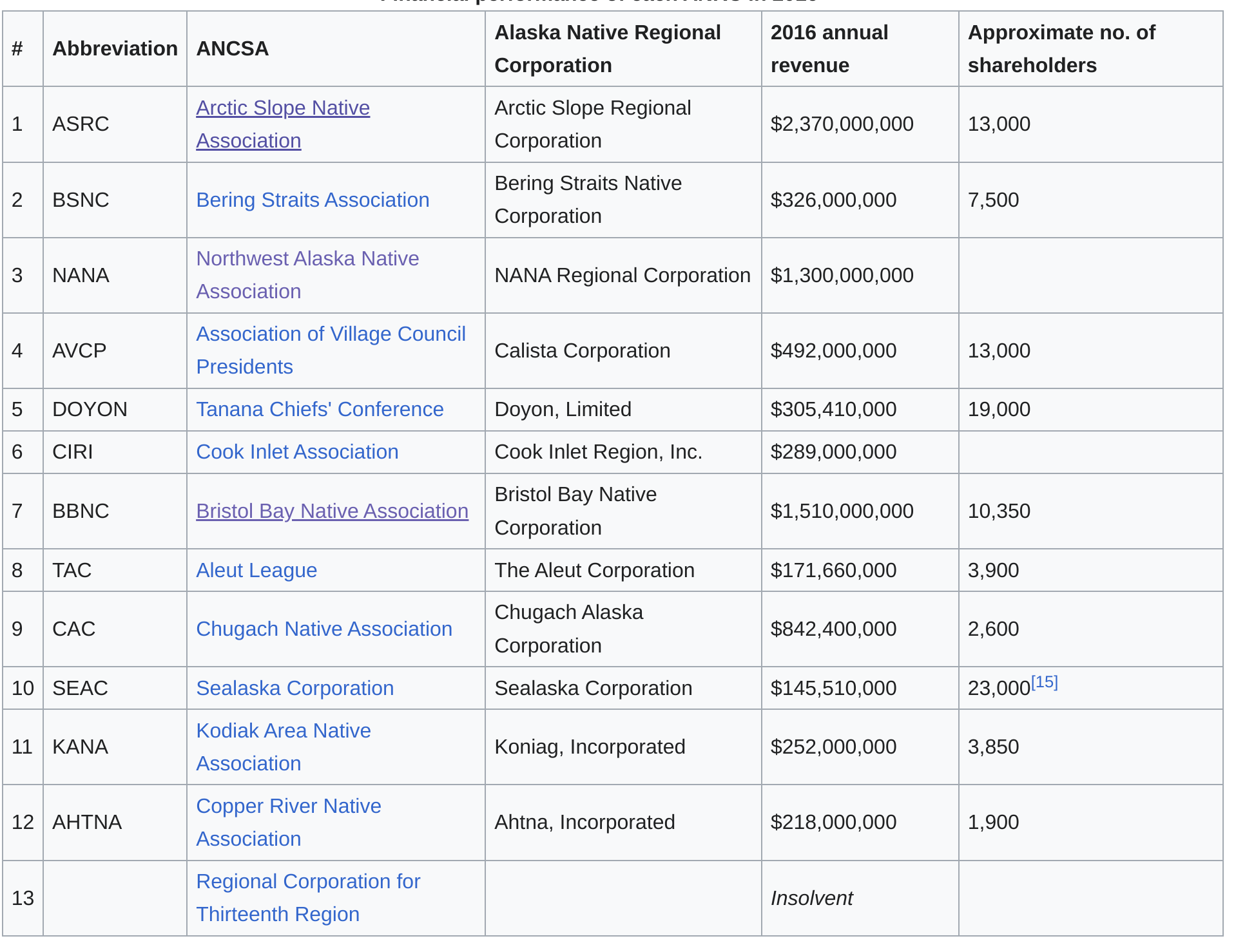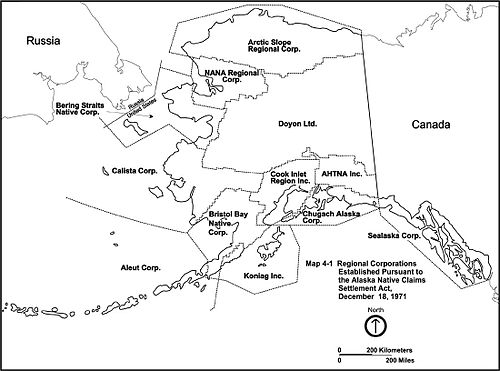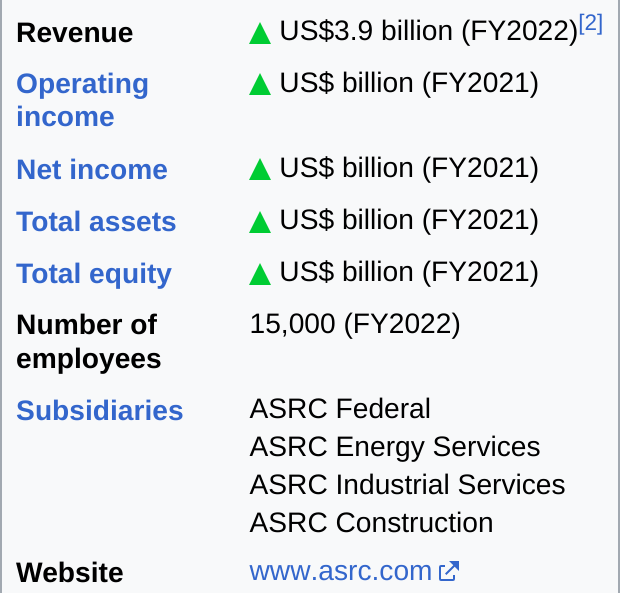interesting corp structure: Alaska Native village Corporations

writen with chatgpipty:
The Strange World of Alaska Native Corporations: Loopholes, Wealth, and Power
Alaska is known for its breathtaking landscapes, harsh winters, and... its bizarre corporate structure? That’s right—Alaska has one of the strangest setups when it comes to corporate governance, thanks to a mix of legal loopholes, federal settlements, and some serious financial power plays. If you’ve never heard of Alaska Native Corporations (ANCs), buckle up—this rabbit hole goes deep.
What Are Alaska Native Corporations?
Unlike the reservation system in the lower 48 states, Alaska Native tribes were structured into corporations through the Alaska Native Claims Settlement Act (ANCSA) of 1971. This act divided native land into regional and village corporations, each with native shareholders. Instead of holding communal lands in trust like many Native American tribes, these corporations own and manage land, resources, and businesses directly.
The Big Money Locked in These Corporations
The sheer amount of money these corporations control is staggering. For example:
- Afognak Native Corporation has about 900 shareholders but pays out over $12 million in dividends annually.
- Afognak’s federal contracts total $749,557,576.49—that’s nearly three-quarters of a billion dollars.
- Arctic Slope Regional Corporation (ASRC) owns an oil refinery, makes billions in revenue, and even has subsidiaries in aerospace.
These aren’t just local businesses—these are massive financial and industrial powerhouses with government contracts, natural resource extraction, and commercial enterprises spanning multiple industries.
Can You Buy a Village Corporation?
The short answer? No, not like a typical company.
- Shares in Alaska Native Corporations aren’t publicly traded.
- They can only be inherited or gifted.
- Some corporations have consolidated over time, but there’s no simple “buyout” mechanism like with other businesses.
- You could, in theory, start a new village corporation—if you have 25 Alaska Native founders.
Do These Corporations Get Special Privileges?
Yes, and that’s where things get interesting.
- Many Native Corporations get access to no-bid federal contracts, which can be worth hundreds of millions.
- Some operate with tax advantages that regular corporations don’t get.
- The question remains: Are these corporations a form of governance? They control land, jobs, and wealth distribution for thousands of Alaskan Natives.
Are Alaska Natives Richer Than Mainland Tribes?
A complicated question, but in many cases, yes.
- Thanks to revenue from oil, fishing, and government contracts, Alaska Natives often see higher dividend payments than many mainland Native Americans.
- Alaska itself has a sovereign wealth fund, the Permanent Fund Dividend (PFD), which pays out money to all residents annually—on top of Native Corporation dividends.
What Happens If a Corporation Goes Bankrupt?
Given their immense financial resources, most haven’t collapsed—but it’s a big “what if.” Unlike typical corporations, their land holdings and governance structures make a bankruptcy scenario much more complex.
Scandals and Controversies
With this much money at play, there’s bound to be corruption.
- Some corporations have faced embezzlement and fraud cases.
- There have been allegations of mismanagement and insider deals.
- Environmental concerns are also an issue—ASRC was ranked one of the most environmentally responsible oil companies in the Arctic, but that’s still an oil company grading on a curve.
Found a New Weird Corporate Structure
Alaska's version of native reservations = village-based corporations. This setup is crazy complicated but incredibly unique.
Key Insights on This Corporate Structure:
- No shares can be traded publicly.
- Shares cannot be legally sold.
- All stock is inherited or gifted.
- These corporations have social and cultural responsibilities to their shareholders.
Use Case:
This structure benefits its members by aligning incentives for the long-term.
- It’s a unique legal structure that only exists in the U.S.
- The corporation’s incentive is to benefit its members over generations.
Idea 💡: Copy This Structure
Imagine creating a similar corporation where joining means you and your descendants get lifelong benefits:
- If you buy a house owned by the corporation, your kids inherit the land.
- Healthcare benefits could be included.
- It could be for-profit, but with incentives aligned for members.
Fun Facts:
- Some subsidiaries own oil companies that consistently rank high on responsible oil company lists.
Conclusion: A Unique System With Unique Questions
Alaska Native Corporations are a fascinating, bizarre blend of business and governance, operating under special legal frameworks and raking in billions. They blur the line between tribal identity, corporate power, and legal loopholes, creating a system that doesn’t exist anywhere else in the U.S.
So what’s the real takeaway? If you ever wanted to create a sovereign-like entity with federal backing, special tax benefits, and insane revenue potential—maybe you should have been born Alaskan Native.
My og version
Found a new weird corporate structure find interesting
Alaska's version of native reservations = village based corporation
Crazy complicated
Key insights corp structure
- no shares can be traded publicly
- cant be legally sold
- all stock is inherited or gifted
- has social and cultural responsibilities to shareholders
-
Use case:
This is a structure for this benefits corporation.
1)Its a weird legal structure that exists in the usa.
2) sets the corps incentive to only benefit its members over the super long term
Idea 💡:
Copy the structure of one of these.
When i join this corp get all the benefits for life and my kids and my descendants.
If i buy a house owned by this corp. My kids would inherit the land.
Could get health insurance as part of this.
Could be 📈for profit but incentives aligned for the members!
Fun facts:
- subsidiaries own oil companies that consistently rank high on responsible oil company lists
They make a alot of money



someone talking about the corps
fun tidbits
corp you get it by "stocks can be inherited or gifted"
Unlike other American corporations, NANA - as an Alaska Native Corporation, has economic, social and cultural responsibilities to its shareholders

15,000 shareholders
NANA has no publicly traded stock and its shares cannot legally be sold, though Class A, B and C stocks can be inherited or gifted.

Author 
by ___ ____ 
github.com/wisehackermonkey





